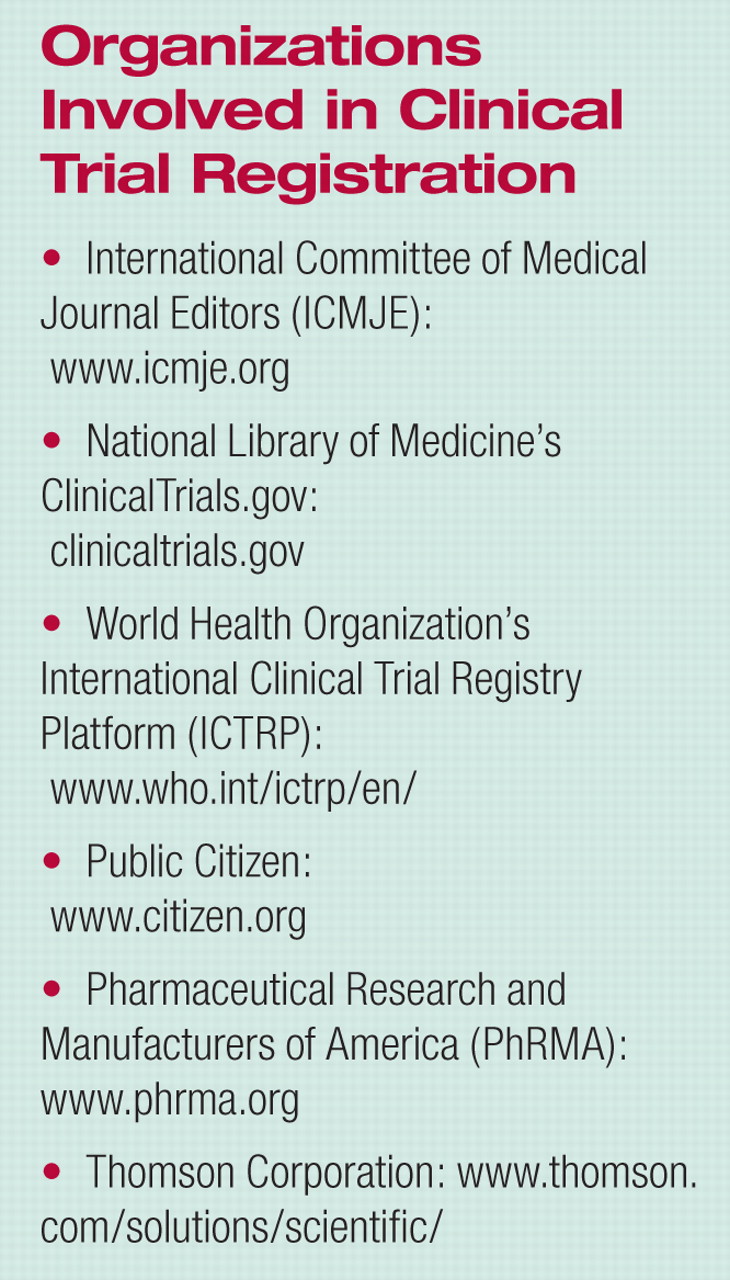Three years after a group of leading medical journal editors pushed for clinical trial registration, public access to prospective clinical trial information has greatly improved. Not only has the U.S. government-funded online database ClinicalTrials.gov ballooned rapidly with new registrants, but the goal of worldwide centralization of databases seems within reach.
A number of factors led to the 2004 announcement by the 12 members of the International Committee of Medical Journal Editors (ICMJE). A flurry of revelations at the time indicated that pharmaceutical companies had been withholding negative clinical trial results from publication, including negative efficacy findings in antidepressant studies. This led to Congressional hearings and public pressure for increased transparency in reporting industry-sponsored clinical trials (Psychiatric News, October 15, 2004). Selective reporting of trials “distorts the body of evidence available for clinical decision making,” argued the members of the ICMJE in a joint editorial released in September 2004. Therefore, for any trial starting on or after July 1, 2005, these 12 journals required clinical trials to be registered in a publicly searchable database before or at patient enrollment as a condition for consideration for publication. This position quickly gained the support of organizations such as APA and the AMA. Many other biomedical journals, including American Journal of Psychiatry, went on to adopt the same policy. For sponsors and researchers, posting study protocols on a free, searchable online database may be useful for study recruitment.
At the urging of ICMJE, ClinicalTrials.gov, which is operated by the National Institutes of Health and accessible at<clinicaltrials.gov>, became open to all types of trials in October 2004, as sponsors and researchers in the United States and other countries rushed to register their trials. The online database was initially set up to post clinical trial information for all serious or life-threatening diseases, as required by the 1997 FDA Modernization Act, and all government-funded trials to allow patients and the public to search for and enroll in these trials.
The impact of ICMJE's policy was dramatic. The entries at ClinicalTrials.gov swelled from about 13,000 trials at the time of the ICMJE announcement to more than 40,000 in April as sponsors and researchers rushed to register their clinical trials, according to an update by the ICMJE in June.
WHO Set Data Standards
In 2005 the World Health Organization (WHO) created the International Clinical Trial Registry Platform (ICTRP) with the ultimate goal of establishing a centralized global repository for all clinical trials (Psychiatric News, June 16, 2006). The platform is a centralized pathway to several primary clinical trial registries in which study-data storage conforms to WHO standards. The platform provides a search portal for public access at<www.who.int/trialsearch/Default.aspx>. By WHO requirement, a primary registry must be owned by a not-for-profit organization or government agency. The primary registries in ICTRP include, in addition to ClinicalTrials.gov, Australian Clinical Trials Registry and ISRCTN, a database owned and operated by Current Controlled Trials Ltd., a group of independent publishing companies headquartered in London.
In July WHO announced the addition of national trial registries from China and India to the data sources. This is a significant development as pharmaceutical research and development become increasingly global. Clinical trials, especially phase 2 and phase 3 trials enrolling thousands of patients, are often conducted in multiple countries. It is therefore critical that a single set of standards and a central repository be available to the public and researchers.
A set of 20 key elements specified by WHO as essential descriptors of a clinical trial protocol were adopted by ICMJE in May 2005. Phase 1 clinical trials were initially exempt from registration by ICMJE, but registration is now required, according to a June editorial posted at its Web site, so that the committee's policy is consistent with WHO's definition of clinical trial.
Private Registries Inconsistent
Public Citizen, a nonprofit public-interest group, recently conducted a review of online clinical trial registries as well as results databases. In its report, released in July, four public, not-for-profit, international clinical trial registries, two privately owned study results databases, and 16 online databases (containing either clinical trial registry or results databases, or both) owned by individual pharmaceutical companies were reviewed. The two private databases were ClinicalStudyResults.org, which is owned and operated by Pharmaceutical Research and Manufacturers of America (PhRMA) and houses clinical study results, and CenterWatch.com, which is owned by the health care and scientific publisher Thomson Corporation. All the private registries except Purdue Canada state on their Web sites that their clinical trials information was prospectively registered on ClinicalTrials.gov, the report indicated, but the individual registries do not always meet WHO's 20 key details in trial presentation.
Part 2 of this series will provide an overview of clinical trial results databases and recent legislation related to public disclosure of all trial results.
ICMJE's policy for clinical trial registration and updates can be accessed at<www.icmje.org> by clicking on links under “ICMJE Editorials.” Public Citizen's report on clinical trial registries and results databases is posted at<www.citizen.org/publications/release.cfm?ID=7534>.▪

